I started out work in MVC about a year ago, I was inspired but not impressed.
I loath the view state and see it as the root of all evil in terms of ASP.NET. This is why I just don't use it and to be perfectly honest why would you?
I took basically the ASP.NET MVC Framework concept and built that in my own way. I changed a couple of things though. I built my controller wrapping code, or URL routing code around dynamic recompilation.
Now, I would go as far as to say that ASP.NET MVC applications will be faster based on how you use it. If you completely abandon WebForms you'll be faster becuase the ASP.NET life-cycle and object model is humongous.
When you're writing you're instantiating an army... no wait, a legion of objects that will participate in the rendering of your view. This is gonna be slower than if you where to express the minimal amount of behavior in the ASPX page itself. (I don't care about view engine abstraction because the support for ASPX pages in Visual Studio is decent, but I've completely dropped WebForms as a concept and basically any ASP.NET framework due to code bloat or not being able to change the things that wire my application).
I've found ways of relying on dynamic recompilation (System.Reflection.Emit) for emitting special purpose objects and code whenever needed. The executing of this code is faster than reflection but initially built through the reflection service. This has given my MVC flavored framework great performance but also very statically typed. I don't use strings and name/value pair collections. Instead my custom compiler services goes in a rewrites a form post to a controller action being passed an reference type. Behind the scene there is a lot of things going on but this code is fast, a lot faster than WebForms or the MVC Framework.
Also, I don't write URLs, I write lambda expressions that get translated into URLs that later tell which controller action to invoke. This isn't particularly fast but it beats having broken URLs. It's like if you had statically typed resources as well as statically typed objects. A statically typed web application? That is what I want!
I would encourage more people to try this out.


